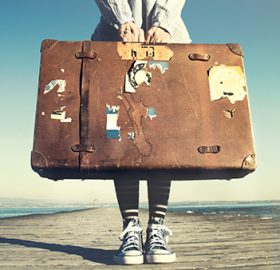What Do I Need to Bring to Canada as an International Student?
Being and international student in a new country, such a Canada, can be challenging and really exciting at the same time. There are a number of things you should be prepared for before you make your big move. Here are some tips for you on what to prepare before you travel.
Make sure you have all your essential documents in place such as:
- A valid passport.
- A valid Canadian Temporary Resident Visa (if applicable).
- A letter of introduction issued by the Canadian Visa Office that approved your Study Permit application. Submit this letter to a Canadian Immigration Officer when you arrive at the border to obtain your actual Study Permit.
- The original Letter of Acceptance from your Canadian University.
- Proof of funds available for your stay in Canada (money transfer, letter of credit, scholarship letter, or other proof).
- Marriage Certificate and/or proof of common-law status (if applicable).
- Any other documents recommended by the Canadian Visa Office where you applied for your Study Permit.
Make sure that you carry all these documents with you. Don’t put these important documents in your checked luggage, and be prepared to show them to any Canadian immigration officer at the border.
Other Documents you will likely want to bring include:
- A list of any items that you are sending separately or which you do not clear through customs when you arrive. Have the list stamped by immigration, if possible.
- Medical and immunization (vaccination) records, translated if possible.
- Medical insurance policy (if applicable).
- Driver’s license or International Driver’s license, and driving insurance records if you plan to drive in Canada.
- A list of important phone numbers.
Personal items to bring with you:
- Medications you may need for the first few months.
- Medical prescriptions.
- Credit card.
- Relevant documents from your previous school (e.g. transcripts, awards, or any other certificates).
- A mobile phone that can be used in Canada. It reduces the cost of your phone plan if you bring your own device.
- Clothing for the different seasons (when you reach Canada you can buy more appropriate clothes for winter).
- Anything memorable such as family pictures, native food, etc. to help you feel more comfortable as you settle in.
By coming prepared you can enjoy this new and exciting experience without worry.
Welcome to Canada! We hope you enjoy your new home.
10 Tips to Help You Get Settled in Canada
There is an excitement and nervousness that you feel when you first arrive in your new Country. You have arrived in Canada, and now you have so many questions. Where do you begin when it comes to getting settled?
Here are 10 tips which can get you headed in the right direction:
- Find your first home in Canada. Whether you decide to rent or purchase, having your first home will be a major accomplishment in your Canadian journey. Check out these top considerations when looking for a place to call your own.
- Shop for appropriate clothing. If you came from a tropical country, you will need proper winter clothing that will stand-up in colder temperatures. Items such as a winter jacket, winter pants, and winter boots – pick ones that are water proof and have good grip. You will also need gloves, scarves, warm socks and toques. Keep yourself warm and dry during the winter months.
- Open a Canadian bank account. Anyone can open a bank account in Canada if they meet the identification requirements set out in the Bank Act. A bank account lets you write cheques, use automated banking machines (ABMs), get paid through direct deposit, and use a debit or credit card for purchases. You can open an account even if you don’t have a job yet or money to deposit, or if you’ve been bankrupt.
- Apply for your Social Insurance Number (SIN) and Healthcare Card. This very important, and you should do it in your first week if possible. Learn how to apply for your SIN card and healthcare card.
- Find a Family Physician. Family doctors treat a wide range of conditions, and are often your primary care providers. In the long term, that means you will want to build a lasting relationship with a family physician. Developing such a relationship allows them to know your medical history inside and out, helping them make accurate diagnoses, watch for red flags regarding medications and monitor changes in your health through the years.
- Find a specialist or consultant for Newcomer’s to Canada. Building a relationship with an immigration specialist will provide you with a resource who can provide information and direction throughout your Canadian journey. They will give you advice, provide information and resources, as well as suggest next steps.
- Strengthen your English with free courses. If you’re a permanent resident or a protected person, you can take language classes at no cost to you. English is a confusing language with lots of words and phrases that are more common in speech than writing, and are typically restricted to a particular context. Practice will strengthen your English abilities and help you get better at identifying appropriate context. Learn more about these classes.
- Get educational equivalency. Being new to Canada it’s really hard to get your dream job right away. Submiting your Educational transcript for equivalency may be a stepping stone to get you there faster. After you receive your equivalency, take it to any college or university and show your IQAS result. The educational institute will decide what additional courses you need based on this information. The advantage of sending your educational documents to IQAS is you may not have to upgrade any additional English or Math, allowing you to start taking other courses right away.
- Make new friends or contacts. Join local sports groups, find a volunteer job, reach out to your new neighbours, or attends short courses. Meeting new people will help you get settled in your new life and can prove beneficial in a variety of areas from personal to professional.
- Find a job. Looking for a job in Canada is like a diving into a “deep blue sea”. Remember you are in a new country and accepting any job will help you overcome challenges that may come up during your settlement period. Stay motivated to reach your goals and you will be successful.
These stepping stones can give a starting point for settled in Canada and help you along the path to living your Canadian dream.

